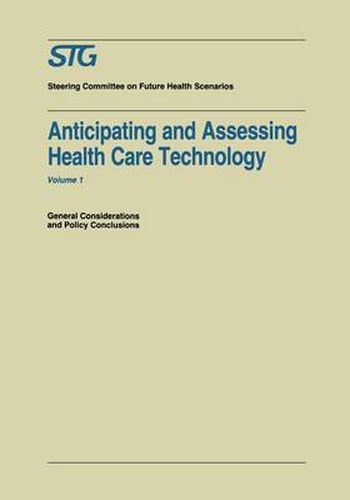Readings Newsletter
Become a Readings Member to make your shopping experience even easier.
Sign in or sign up for free!
You’re not far away from qualifying for FREE standard shipping within Australia
You’ve qualified for FREE standard shipping within Australia
The cart is loading…






This title is printed to order. This book may have been self-published. If so, we cannot guarantee the quality of the content. In the main most books will have gone through the editing process however some may not. We therefore suggest that you be aware of this before ordering this book. If in doubt check either the author or publisher’s details as we are unable to accept any returns unless they are faulty. Please contact us if you have any questions.
This report, Anticipating and Assessing Health Care Technology, is the first report from the STG Commission on Future Health Care Technology. The STG (Stuurgroep Toekomstscenario’s Gezondheidzorg) was established in 1983 as an independent advisory group to the State Secretary for Welfare, Public Health, and Cultural Affairs (WVC) to assist in long-range health planning efforts. Thus far, STG commissions have examined cardiovascular disease, cancer, aging, and life styles as issues of importance to the health of the Dutch population in the future. Obviously, health care technology is of great concern to the government. On the one hand, technology is one of the major tools to promote a healthy population. On the other hand, the costs of health care have been rising at an alarming rate in recent years. It was these two facts, along with the social consequences of certain technologies such as genetic screening, that led the STG to establish the Commission on Future Health Care Technology in 1985. The European Office of the World Health Organization (EURO) cosponsored the project. The Health Council (Gezondheidsraad) agreed to cooperate with the project by furnishing space and intellectual and logistical support. The goal of the Commission’s work is to develop sufficient information on future technological developments in health and health care to assist planning for their consequences. Subsequent reports will give more detail on future health care technologies and will provide in-depth assessments on a few specific technological areas.
$9.00 standard shipping within Australia
FREE standard shipping within Australia for orders over $100.00
Express & International shipping calculated at checkout
Stock availability can be subject to change without notice. We recommend calling the shop or contacting our online team to check availability of low stock items. Please see our Shopping Online page for more details.
This title is printed to order. This book may have been self-published. If so, we cannot guarantee the quality of the content. In the main most books will have gone through the editing process however some may not. We therefore suggest that you be aware of this before ordering this book. If in doubt check either the author or publisher’s details as we are unable to accept any returns unless they are faulty. Please contact us if you have any questions.
This report, Anticipating and Assessing Health Care Technology, is the first report from the STG Commission on Future Health Care Technology. The STG (Stuurgroep Toekomstscenario’s Gezondheidzorg) was established in 1983 as an independent advisory group to the State Secretary for Welfare, Public Health, and Cultural Affairs (WVC) to assist in long-range health planning efforts. Thus far, STG commissions have examined cardiovascular disease, cancer, aging, and life styles as issues of importance to the health of the Dutch population in the future. Obviously, health care technology is of great concern to the government. On the one hand, technology is one of the major tools to promote a healthy population. On the other hand, the costs of health care have been rising at an alarming rate in recent years. It was these two facts, along with the social consequences of certain technologies such as genetic screening, that led the STG to establish the Commission on Future Health Care Technology in 1985. The European Office of the World Health Organization (EURO) cosponsored the project. The Health Council (Gezondheidsraad) agreed to cooperate with the project by furnishing space and intellectual and logistical support. The goal of the Commission’s work is to develop sufficient information on future technological developments in health and health care to assist planning for their consequences. Subsequent reports will give more detail on future health care technologies and will provide in-depth assessments on a few specific technological areas.